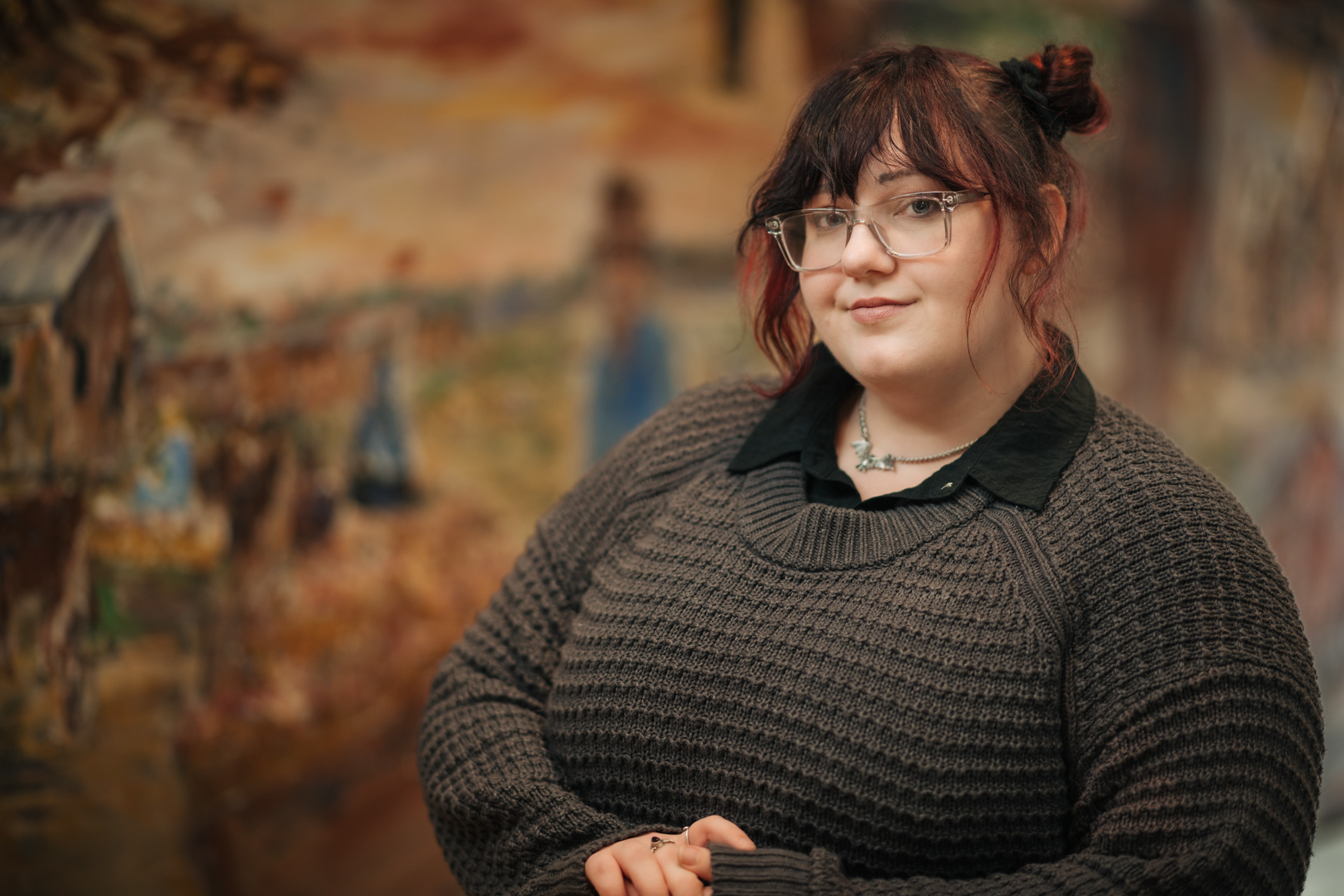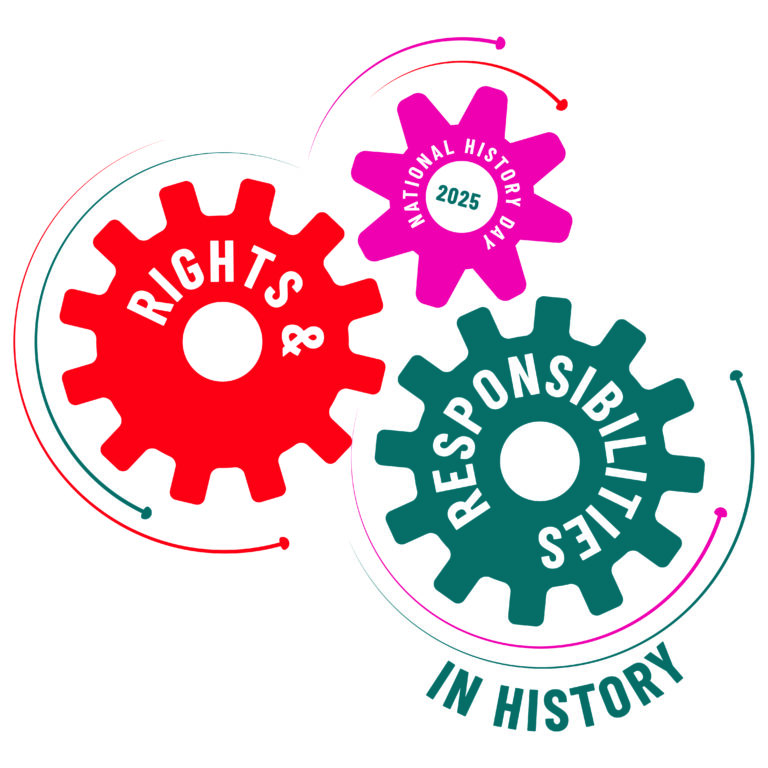Delaware History Day: A Celebration of History in the First State
April 29, 2025
by Helen Siers, MA

It’s early on a Saturday morning in April at Stanton Middle School and the nervous energy is palpable as students begin to cluster in the halls and auditorium. Instead of sleeping in, scrolling their socials, or chasing any moment of their weekend’s free time, a collection of middle and high school students prepares for the culmination of an academic year spent on exhibits, documentaries, websites, and papers. They prepare for Delaware History Day, the Delaware affiliate of National History Day.
National History Day (NHD) has been a hallmark in the United States for over fifty years. Each year, NHD designates a theme for students across the country to consider as they develop and design projects centered around how that theme is represented in history. Students between grades 6-12 identify a point of historical interest and independently research their topic. They work, individually or in small groups, to create tri-fold exhibitions, home-made documentaries, performances, write papers, or create interactive websites that showcase this point in history. Each project is then judged by teams of adults from their community—teachers, museum professionals, historians, or history buffs—and awarded based on the research, content, and knowledge these students have shown. It is a labor of a particular, albeit rare, love: the love of history, the love of the past, and the love of learning from those who came before us.

This year’s theme was “Rights and Responsibilities in History”. As part of a team of four judges, I had the honor of judging the senior division group documentaries. These were teams of two high school students apiece, presenting their process papers—short, 500-word essays outlining how and why they chose their project—and the sources used in their documentaries before showing us the product of a year’s worth of effort.
The four sets of students we met were enthusiastic, excited, and devoted to their subjects. The students created high-level documentaries with videos, voiceovers, and images that detailed the history of subjects like how advertisements from the 1950s-70s showcased women’s societal roles, the journey of Representative Sarah McBride’s life in politics, the history of Japanese Americans in internment camps during World War II, and the lived experience of Vietnamese refugees in America during the Vietnam War.
Each group of students found inspiration in history drawing on their own experiences living and growing up in a 21st century United States. Part of the process for each student was to find what part of history spoke to them most—for some it was young women seeing how the advertisements from the 1950s-70s impacted them now and looking to the past to see how the advertisements presented impacted women who came before them, while for others it was the stories of their own friend’s family who were imprisoned in an internment camp in California. Other students expressed more personal stories, with students drawing on their personal relationships with state politics or the experiences of direct family members. One of the students, paired with another, performed an oral history interview with his own grandfather—a refugee from the Vietnam War—to preserve and share his grandfather’s experience.
I was also delighted to see the tri-fold exhibit, Nancy Lynch’s Vietnam Mailbag by Sophie El-Bietar, a senior at Cab Calloway School of the Arts. This exhibit was inspired by “Vietnam Mailbag” one of Delaware Humanities’ most popular Speakers presentations. During her program, journalist Nancy Lynch discusses and reads selected war letters from her book, Vietnam Mailbag, Voices From the War: 1968-1972, based on her popular newspaper column, “Nancy’s Vietnam Mailbag.” She is often accompanied by Vietnam veteran Rick Lovekin, a former Huey helicopter door gunner, Cobra crew chief, and frequent letter writer to Nancy, who shows slides from Vietnam set to 1960s music. To discover that one of Delaware Humanities’ Speakers presentations inspired a NHD exhibit was incredibly moving.

After all, these students participate in NHD by choice, selecting the stories that speak to them, that reflect their lives and their experiences. In doing so, these students are forming vital connections to the past in order to shape their present and their futures. Not only do events like Delaware History Day and National History Day foster a love and appreciation for history as a subject and a story, but these events encourage students to draw connections between themselves and those who came before them.
Often, we see the impact of our history fading from our present. We lose sight of the significance of those who paved the way for us to be living in the country that we are living in, to be living the lives that we live. We lose sight of those who suffered, those who fought, and those who gave everything they had—including their lives—to give us the world we inhabit so freely and so fiercely.
These students have not yet lost that sight. Everyone who participated in National History Day reached back into a past that risks being overshadowed and forgotten and took from it the hard-fought and hard-won lessons of endurance, survival, and change. These students took from the past inspiration for more than just a project—every student I spoke to talked about how their research changed how they thought of the past and the present.
Dr. C.M. Porter, a college professor of mine, used to say that, “history is not a march towards progress.” From that, I used to understand that history is a story that is riddled with flaws. History is a story that rises and it falls, bringing with it grand narratives of victory and community and the reminders of suffering and grief. To lose touch with history is to lose touch with the greatest lessons that could ever inform the way you interact with your neighbors, your friends, and your family.
It is often terrifying to consider that we may be losing that touch. But watching documentaries in a middle school in Delaware, while a nervous rustle of students walks the halls in the early hours of a Saturday morning, I felt the hope for the future generation begin to renew. Our history is not lost or forgotten among the young. It is safe, in the hands of excited, enthusiastic young students who will one day—if we are all lucky—go on to become excited and enthusiastic adults safeguarding our past and our future.
It is here that I must make a vital note. National History Day is at risk. For over fifty years, it has served our country as a way to bring history to students. Recently, a grant promised to NHD by the National Endowment for the Humanities was terminated at the behest of the Department of Government Efficiency (DOGE). Without this funding, National History Day is at a serious risk of having to cease operations. These students will never be able to showcase their passion projects on the national scale, and the students who come after them will never have the chance to learn from their history in the same way that the students who came before them have.
Losing National History Day means losing one of the best connections the younger generation has to history.
As of the publishing date of this blog, National History Day was notified that their grants from the National Endowment for the Humanities were cancelled. This means a loss of more than $336,000 over the next two years for the NHD organization. For more information on National History Day, visit www.nhd.org.
Due to recent funding cuts to the NEH, Delaware Humanities has had to pause programs and grants. Requests for new Speakers presentations are currently closed. For more information on the impact of the NEH funding cuts on Delaware Humanities, click here.
